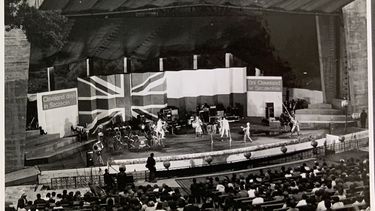The study, published in a special town twinning edition of the Cambridge University Press’ journal Urban History, is the first academic analysis of the changes, challenges, continuities and continued relevance of town twinning in Middlesbrough, one of Britain’s leading pro-Brexit areas, focusing on the challenges and opportunities arising from twinning partnerships with Oberhausen, Germany and Dunkirk in France as well as connections in Poland and Zimbabwe.
The research includes interviews and reflections from key stakeholders in town twinning including former mayors and council directors, and also draws upon material from the collections of Middlesbrough Libraries and Teesside Archives, including diary extracts and a report from a trip to Middlesbrough arranged by the Oberhausen Education Department in 1953 which includes visits to Boro’s Ayresome Park and the Tees Transporter Bridge.
As well as reflecting on the history of town twinning – including links that failed to materialise and exploring reasons for the success and decline of international partnerships - the research also reveals data obtained from a Freedom of Information request to Middlesbrough Council that highlights a significant decline in activity since the changes brought by shifts in local and national politics and the pandemic. In fact, no money was spent by Middlesbrough Council on twinning and no events or exchanges have been recorded between the introduction of Covid-19 restrictions in the UK in mid-March 2020 up to the end of financial year 2021/2022. However, in recent months exchanges with Deputy Mayor Philippa Storey welcoming a German visit to Middlesbrough in July 2023 and describing the relationship as having ‘really has stood the test of time’.
The article also highlights some of the perceived challenges around Brexit and town twinning, with efforts redoubled following the Brexit result to reaffirm the commitment to international friendship and learning through ensuring the survival of Middlesbrough’s connections with Europe.
Dr Tosh Warwick, Research Associate at the University of Sheffield said: “The research provides some new insights into the origins and development of Middlesbrough’s relationship with our European friends and the broader cultural and economic benefits this brings for the area.
“Following the Brexit vote which posed a perceived threat for twinning relationships, the interviews and responses from key stakeholders highlights their determination to ensure that we continue to learn and engage with our partners on the continent despite the challenges posed by Brexit, the pandemic and the implications of local government austerity.”
Dr Tosh Warwick’s article is accessible via the Cambridge University Press’ Urban History website (subscription required)
A free to access version of the article is available to read without subscription here





